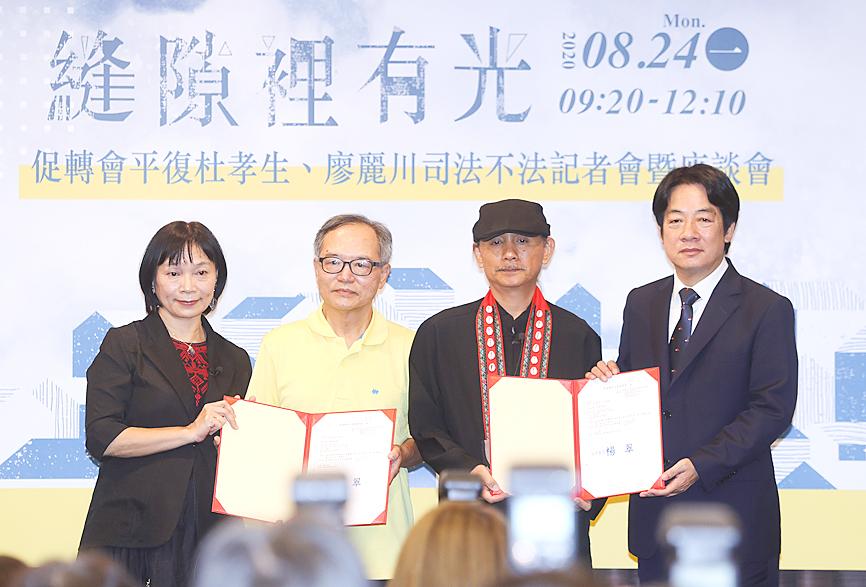The Transitional Justice Commission yesterday exonerated Voyue Tosku (杜孝生) and Liao Li-chuan (廖麗川) — two victims of political persecution during the White Terror era — at a ceremony at the Executive Yuan.
Voyue — a Tsou man who received a 17-year prison sentence in 1954 for corruption — was accused of involvement with Aboriginal leaders who were fighting for self-rule for Aborigines.
At yesterday’s ceremony, which was attended by Vice President William Lai (賴清德), Voyue’s son, Voyu Tosku (杜銘哲), said that while the number of people who lived through the White Terror era is dwindling, their voices would carry on.

Photo: Fang Pin-chao, Taipei Times
Voyu thanked the public for bringing his father’s case to a conclusion after more than 70 years.
Today’s democracy is the result of the shared experience of Taiwanese who lived through the White Terror era, he said.
Following his father’s release after four years in prison, the family was forced to relocate to Chiayi County’s Dapu Township (大埔), where they were the only Aboriginal family, Voyu said.
The move cut them off completely from the Tsou community, he said, adding that his father’s exoneration meant that his story could be told in their family’s hometown in Alishan.
Having lived outside of Alishan for more than 60 years, Voyu said he would probably not move back there, but expressed the hope that Taiwan would become a culturally diverse nation that celebrates its Aborigines.
In 1954, Voyue, who was then the head of the public health department in Alishan Township (阿里山), then called Wufeng Township (吳鳳), and Liao, head of the township office, became embroiled in a corruption case involving Tsou leaders Uyongu Yatauyanguna (湯守仁) and Uyongu’e Yatauyungana (高一生).
Voyue’s and Liao’s families were unable to seek redress and compensation through the Compensation Foundation for Improper Verdicts (財團法人戒嚴時期不當叛亂暨匪諜審判案件補償基金會), as their cases did not involve charges related to civil strife or foreign aggression, the commission said.
However, in response to requests from the two men’s sons, the commission launched an investigation into their cases and found evidence of judicial malpractice, and repealed the charges in accordance with the Act on Promoting Transitional Justice (促進轉型正義條例), it said.
The men’s trials were part of the authorities’ efforts during the White Terror era to exercise control over Alishan Township and its residents, and were a violation of their constitutional rights and freedoms, it said.
The now-defunct Taiwan Garrison Command’s interference in the cases was also a violation of the principle of a fair trial, it added.

POSITIVE DEVELOPMENT: Japan and the US are expected to hold in-depth discussions on Taiwan-related issues during the meeting next month, Japanese sources said The holding of a Japan-US leaders’ meeting ahead of US President Donald Trump’s visit to China is positive news for Taiwan, former Japan-Taiwan Exchange Association representative Hiroyasu Izumi said yesterday. After the Liberal Democratic Party’s landslide victory in Japan’s House of Representatives election, Japanese Prime Minister Sanae Takaichi is scheduled to visit the US next month, where she is to meet with Trump ahead of the US president’s planned visit to China from March 31 to April 2 for a meeting with Chinese President Xi Jinping (習近平). Japan and the US are expected to hold in-depth discussions on Taiwan-related issues during the

‘LIKE-MINDED PARTNER’: Tako van Popta said it would be inappropriate to delay signing the deal with Taiwan because of China, adding he would promote the issue Canadian senators have stressed Taiwan’s importance for international trade and expressed enthusiasm for ensuring the Taiwan-Canada trade cooperation framework agreement is implemented this year. Representative to Canada Harry Tseng (曾厚仁) in an interview with the Central News Agency (CNA) said he was increasingly uneasy about Ottawa’s delays in signing the agreement, especially as Ottawa has warmed toward Beijing. There are “no negotiations left. Not only [is it] initialed, we have three versions of the text ready: English, French and Mandarin,” Tseng said. “That tells you how close we are to the final signature.” Tseng said that he hoped Canadian Prime Minister Mark Carney

President William Lai (賴清德) yesterday bestowed one of Taiwan’s highest honors on Saint Vincent and the Grenadines (SVG) Ambassador Andrea Clare Bowman in recognition of her contributions to bilateral ties. “By conferring the Order of Brilliant Star with Grand Cordon on Ambassador Bowman today, I want to sincerely thank her, on behalf of the Taiwanese people, for her outstanding contribution to deepening diplomatic ties between Taiwan and SVG,” Lai said at a ceremony held at the Presidential Office in Taipei. He noted that Bowman became SVG’s first ambassador to Taiwan in 2019 and

A man walks past elementary school artworks at the Taipei Lantern Festival in Ximen District yesterday, the first day of the event. The festival is to run from 5pm to 10pm through March 15.